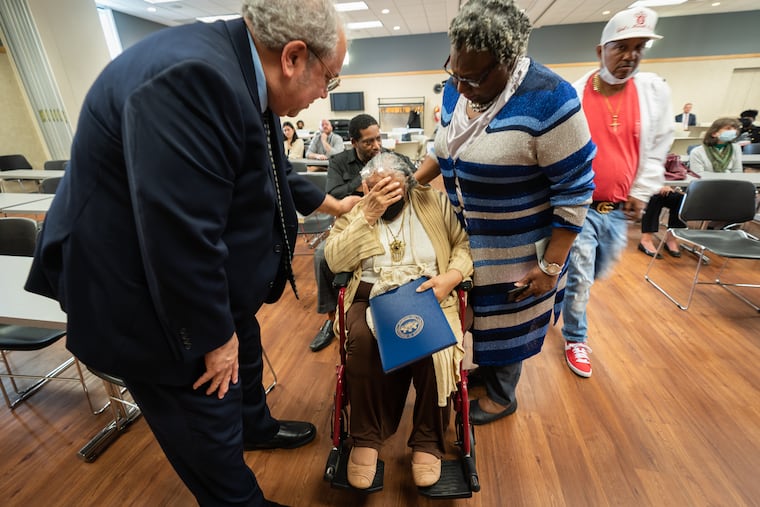Gov. Wolf exonerated a Delco teen who was executed decades ago for a murder he didn’t commit
Alexander McClay Williams was executed in 1931 at 16, the youngest person to be put to death in Pennsylvania history.

Nine decades after Alexander McClay Williams was executed for a murder prosecutors now say he didn’t commit, his name has been cleared.
Gov. Tom Wolf on Monday exonerated Williams, who was 16 years old in 1931, when he was convicted of killing a matron at the Glen Mills School for Boys and sentenced to death.
In a late-afternoon ceremony attended by Williams’ 92-year-old sister, Susie, and her family, a proclamation from the governor exonerating Williams of the murder was read aloud‚ declaring his innocence and righting a long-ago wrong.
“This makes me really, truly happy,” Susie Williams-Carter said, tearfully. “When the resurrection comes, my mom and dad will know they were always right, and that he never did this.”
In 1931, an all-white jury convicted Williams, who was Black, in the death of Vida Robare, a white matron at Glen Mills who was found dead inside a cabin on the property. Police say she had been stabbed 47 times with an ice pick. Her ribs were broken and one of her eye sockets was fractured.
Her ex-husband, who had a history of domestic violence against her, called police to report finding her dead. He was quickly ruled out as a suspect, and suspicion fell on Williams, who had been sent to Glen Mills by a county judge after burglarizing a post office and setting a fire that destroyed a barn and caused $25,000 worth of damage.
The jury took took just four hours to convict Williams, and he was executed six months later, the youngest person ever put to death in Pennsylvania history.
For decades, Williams’ family insisted he had been wrongfully convicted. In recent years, they found an ally in Samuel Lemon, the great-grandson of the lawyer who represented Williams during his trial.
Lemon learned that prosecutors had failed to introduce key evidence, including a man’s bloody handprint found at the scene. And he determined that Williams had been working elsewhere on the property at the time of the murder and could not have been at the crime scene.
In June, Delaware County Court Judge Kevin F. Kelly granted Williams a new trial, in part because of the evidence uncovered by Lemon and attorney Robert Keller. Immediately afterward, District Attorney Jack Stollsteimer withdrew the charges, clearing Williams’ name.
Stollsteimer, speaking at Monday’s ceremony, said Keller and Lemon’s efforts were nothing short of “divine intervention.”
“This is a great testament to the Delaware County legal profession, that they were able to right this wrong,” Stollsteimer said. “In our line of work, it’s never too late for justice.”
In the proclamation from the governor, presented by Celeste Trusty, the secretary of the state board of pardons, he apologized to Williams’ family for the “egregious miscarriage of justice.”
Trusty echoed Wolf’s comments, saying the state took Williams away from his family “in the most permanent way possible.” The exoneration, she said, is a part of the state “recognizing the wrongs of the past.”
“The Board of Pardons should have and could have intervened, but they did not, and, shamefully, they allowed his execution to continue,” Trusty said, her words thick with emotion.
» READ MORE: From June: "After 91 years, the murder conviction of a Delaware County teen has been overturned"
Lemon’s research found that Robare, the victim, was actually one of the few people at the Glen Mills School who showed kindness to Williams. It made no sense, he said, that Williams would harm her.
The more likely culprit, he said, was her abusive ex-husband, whom she had divorced but had recently moved back in with on the grounds of the school. But police charged Williams with the crime, and his attorney, William Ridley, was given just $10 and a matter of weeks to prepare a defense before the trial began.
Lemon, in his remarks Monday, said he was humbled to have completed a task he had devoted much of his adult life to, in memory of his great-grandfather.
“Really, this is a dream come true in many, many ways,” he said.